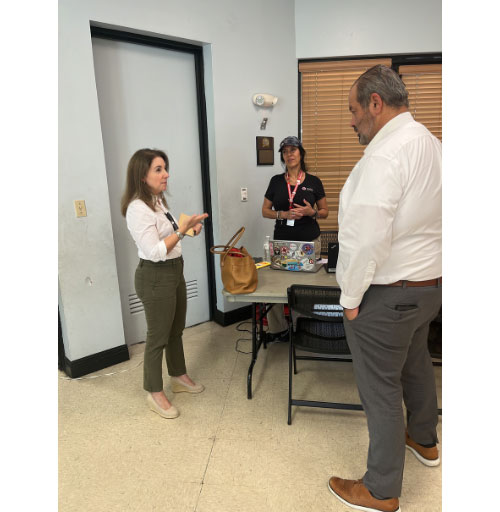By Stephanie Wesseling, American Red Cross Public Affairs
The torrential rains that swept through South Florida roughly two weeks ago resulted in unprecedented flooding, forcing families out of their homes. In response, the Red Cross quickly mobilized, opening three emergency shelters across the affected areas to provide immediate relief and support to those displaced by the floodwaters.
Among the dedicated volunteers tasked with helping families recover is Susy Rodriguez, a South Florida Red Cross volunteer. Rodriguez initially volunteered with the Red Cross over 30 years ago during Hurricane Andrew but took some time off to start a family and pursue a career in real estate.
Fast forward a few decades, Rodriguez returned to the Red Cross and now serves as the Shelter Resident Transition (SRT) Lead for the South Florida region.
The SRT program is a service the Red Cross provides to help shelter residents develop an individualized action plan to transition from a temporary shelter to a more sustainable living solution.
The initial days after a disaster can be chaotic. People often arrive at shelters in a state of shock, some having lost nearly everything. The first priority of the Red Cross is to make sure everyone feels safe and has their basic needs met. However, as the days go on, the Red Cross shifts its focus to helping these families find more stable, long-term housing solutions.
Volunteers like Rodriguez meet with shelter residents to identify their transition needs, help them overcome barriers and support them as they move into a more sustainable living arrangement after a disaster.
“There’s no one cookie-cutter path to recovery. Everybody’s needs are different. Everyone’s pre-disaster situation is usually different. So, it is a very individualized process,” says Rodriguez.
One of the families Rodriguez assisted had been living in a ground-floor apartment that was submerged in the flood. The extended family of five, including two young boys, their parents and a cousin, were devastated. The cousin is the family’s breadwinner, and he lost his laptop, which helped supplement the family’s income.
“Disaster can totally disrupt lives, change your daily routine and family makeup. Some families may get separated, have their livelihood taken away, or have their savings and plans for the future totally wiped out. It’s a total disruption of someone’s life,” says Rodriguez.
Rodriguez worked closely with the family, coordinating with their property management company, which found a temporary apartment until their original home could be repaired and readied for them to move back in.
Another family Rodriguez helped consisted of parents and their four children ranging in age from toddler to teenager. The family found themselves at a North Miami shelter with nowhere else to go. Through a combination of local resources and partnerships, Rodriguez connected the family to a local nonprofit that offered them a temporary apartment and will continue to work with the family to locate a subsidized and sustainable housing arrangement.
After a disaster, the Red Cross works closely with local partners to coordinate recovery services to ensure people get the help they need to get back on their feet.
“It’s great that the Red Cross was able to connect them to the right resources,” says Rodriguez.
Both families received financial assistance, care kits containing towels, sheets, blankets and toiletries, cleanup kits with cleaning supplies and vouchers from Goodwill to replace their clothing. These essential supplies can make a huge difference in the lives of families starting over in a new home.
The floodwaters have since receded and the communities continue the long process of recovery. Red Cross shelters have slowly emptied out and displaced residents have transitioned to more sustainable housing arrangements. For Rodriguez, the work is far, but she is grateful that she was able to give some families a fresh, new start.
“I am awed every day by the Red Cross. By their mission and by their ability to respond so quickly and so generously to folks that are overcoming a disaster,” Rodriguez says.
You can help people affected by disasters like floods, tornadoes and countless other crises by donating to support Red Cross Disaster Relief. Your gift enables the Red Cross to prepare for, respond to and help people recover from disasters big and small. Visit redcross.org, call 1-800-RED CROSS (800-733-2767) or text the word REDCROSS to 90999 to make a $10 donation.






